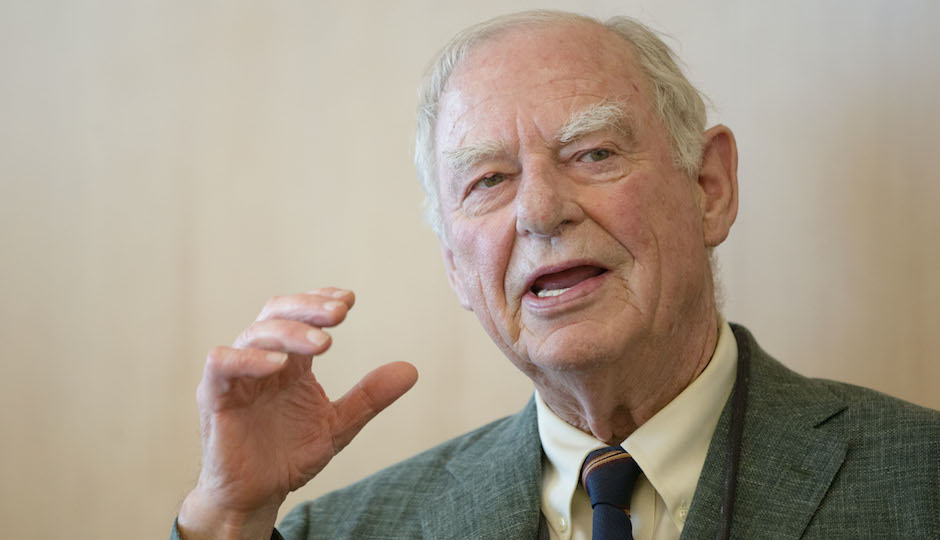Should Philly’s Newspapers Operate as Charity Cases?

Philanthropist H.G. “Gerry” Lenfest speak at a news conference after a closed-door auction to buy the The Philadelphia Inquirer and Philadelphia Daily News Tuesday, May 27, 2014, in Philadelphia. Photo | AP, Matt Rourke
Gerry Lenfest has spent much of the last decade giving his fortune away for worthy causes. So maybe it’s no surprise that when he finally sealed his complete ownership of Interstate General Media this week, Lenfest ended up sounding like Philly’s major newspapers were another one of his philanthropic enterprises
“I’ve given a lot of money away,” he told the Daily News. “But I can’t think of any cause that we support that’s more important than the support of the newspapers.”
Lenfest’s actions also matched the look of a man who isn’t anticipating great profit. He’s setting up a corporation that will continue to oversee the papers “just in case I kick the bucket,” and says he’ll create a board of directors composed of five to seven community leaders. That sounds more like the governance of a trust than a multi-million-dollar business.
All of which raises the question: Why not just follow these ideas to their natural conclusion and formally turn the Inquirer and Daily News into non-profit enterprises?
The idea, after all, has been percolating for a couple of years — at least since the previous ownership group, led by George Norcross, took control of the papers. Lenfest was then a minority shareholder in the papers.
“When we bargained with the company for our last contract, we asked Mr. Lenfest if he would consider turning the company into a non-profit,” said Daily News columnist Howard Gensler, who is president of the Newspaper Guild that represents IGM’s journalists. “He said he bought in as a business.”
Gensler added: “Of course he had partners then and he was a minority owner. Now that he’s the solo owner, maybe he has other ideas.”
Newspaper journalism is having a rough time all over the United States, of course, not just in Philly. The decline of daily newspapers as going concerns has led to the apparent rise of non-profit journalism sources, ranging from outlets like Pro Publica that investigate stories and share their work with established news outlets, to outfits like the Texas Tribune that try to cover regional news. (Locally, Axis Philly was supposed to fill this kind of niche, but it closed earlier this month without apparently having built much of an audience beyond other Philadelphia journalists.)
There aren’t many examples of a major daily newspaper operating as a non-profit, however — at least, not yet. The closest is the Tampa Bay Times, which has been operated by the Poynter Institute since the late 1970s, when newspaper owner Nelson Poynter died.
The Times, though, is probably more a testament to Poynter’s own idiosyncrasies than it is a model for the Inquirer and Daily News to follow. Poynter set up institutional ownership not to preserve the paper’s future, but to keep it out of the hands of his heirs.
“His idea was — back when papers were worth lots and lots — he didn’t want to leave it to the next generation,” said Rick Edmonds, a media industry analyst at the Poynter Institute.
In fact, for most of their joint history, it was cash profits from the Times that kept the Poynter Institute afloat, not the other way around. The institute has been forced to fund-raise and seek other income sources in recent years as the Times dealt with the same headwinds — declining circulation, plummeting ad sales — that every other newspaper has faced.
There might be obstacles to setting up a major daily newspaper like the Inquirer as a non-profit, Edmonds said. The IRS has traditionally taken a dim view of newspapers claiming non-profit status, he said, unless they are owned by a school, a church, or a hospital. (Poynter counts as the former.) Beyond that, though, is the question of resources: Turning a publication into a non-profit doesn’t mean it doesn’t need money. There are still reporters and editors to pay, presses to run, offices to be staffed.
“I guess the question for right now might be: If you set up this arrangement, is there a stream of substantial profits that can be used to build the institute?” Edmonds said.
Which brings us back to Lenfest. Just how philanthropically he sees the newspapers — would he be willing to operate them at a loss? — isn’t really known: A spokesman told me Thursday Lenfest “is now taking the necessary steps to remain strictly focused on the business” and not ready to talk to outside media.
Gensler, meanwhile, says the key to everything is simply to ensure that the papers become economically stable. That might sound like putting the cart before the horse, but it’s necessary.
“When you’re losing money, every model is problematic unless someone wants to just keep pumping in money,” he said. “If we can stabilize the business and figure out ways to grow — and I believe the Guild is in a better position to help Mr. Lenfest do that than anyone who may have his ear right now — then there’s a lot more flexibility in terms of how to run the company going forward.”
Follow @JoelMMathis on Twitter.


